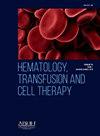Clinical and laboratory profile of patients with positive direct antiglobulin test attended at a university hospital in Goias, Brazil
IF 1.8
Q3 HEMATOLOGY
引用次数: 0
Abstract
Objective
To clinically and laboratory characterize patients with a positive direct antiglobulin test (DAT) treated at the Hospital das Clínicas of the Federal University of Goiás (HC-UFG).
Methods
A retrospective, descriptive, cross-sectional study was carried out collecting data from medical records of patients with a positive DAT who were treated at HC-UFG between August 2021 and August 2022.
Results
Eighty-four patients with positive polyspecific DAT results were screened in the clinical laboratory. Fifty-four patients had a laboratory profile compatible with autoimmune hemolytic anemia (AIHA), however, among these, 16 patients already had a diagnosis of AIHA in their medical records. The most common symptoms present among AIHA patients were pallor, asthenia, fatigue and dyspnea. For the remaining patients, the most common symptoms were severe thrombocytopenia, anemia, renal dysfunction, fever, myalgia, headache, thrombosis, asthenia, hematuria and joint pain. Only one patient had primary AIHA, that is, he had no evident underlying disease. The majority of AIHA patients (75 %) underwent corticosteroid therapy with 60 % having a positive response. For patients without AIHA, prednisone was the most frequently prescribed medication in 17 (25 %) patients, followed by hydroxychloroquine (14 patients - 20.1 %).
Conclusion
It is essential to evaluate patients with positive DAT in detail in order to understand the real clinical case. The DAT serological result alone does not arrive at a conclusive diagnosis of AIHA, and so it must be evaluated in conjunction with both clinical data and other laboratory tests, such as hemoglobin concentration and hemolysis tests (reticulocytes, lactate dehydrogenase and/or haptoglobin).
巴西戈亚斯一所大学医院直接抗球蛋白试验阳性患者的临床和实验室概况
目的探讨在Goiás联邦大学Clínicas医院(HC-UFG)直接抗球蛋白试验(DAT)阳性患者的临床和实验室特征。方法进行回顾性、描述性、横断面研究,收集2021年8月至2022年8月期间在HC-UFG治疗的DAT阳性患者的医疗记录数据。结果临床实验室共筛选出84例多特异性DAT阳性患者。54例患者的实验室检查结果与自身免疫性溶血性贫血(AIHA)相符,然而,其中16例患者在医疗记录中已被诊断为AIHA。AIHA患者最常见的症状是苍白、虚弱、疲劳和呼吸困难。其余患者最常见的症状为严重的血小板减少、贫血、肾功能不全、发热、肌痛、头痛、血栓形成、虚弱、血尿和关节痛。只有1例患者为原发性AIHA,即没有明显的基础疾病。大多数AIHA患者(75%)接受了皮质类固醇治疗,其中60%有阳性反应。对于没有AIHA的患者,强的松是17例(25%)患者中最常用的处方药,其次是羟氯喹(14例- 20.1%)。结论对DAT阳性患者进行详细的评估是了解临床真实情况的必要条件。单独的DAT血清学结果不能得出AIHA的结结性诊断,因此必须结合临床数据和其他实验室检查,如血红蛋白浓度和溶血试验(网织红细胞、乳酸脱氢酶和/或接触珠蛋白)进行评估。
本文章由计算机程序翻译,如有差异,请以英文原文为准。
求助全文
约1分钟内获得全文
求助全文
来源期刊

Hematology, Transfusion and Cell Therapy
Multiple-
CiteScore
2.40
自引率
4.80%
发文量
1419
审稿时长
30 weeks
 求助内容:
求助内容: 应助结果提醒方式:
应助结果提醒方式:


